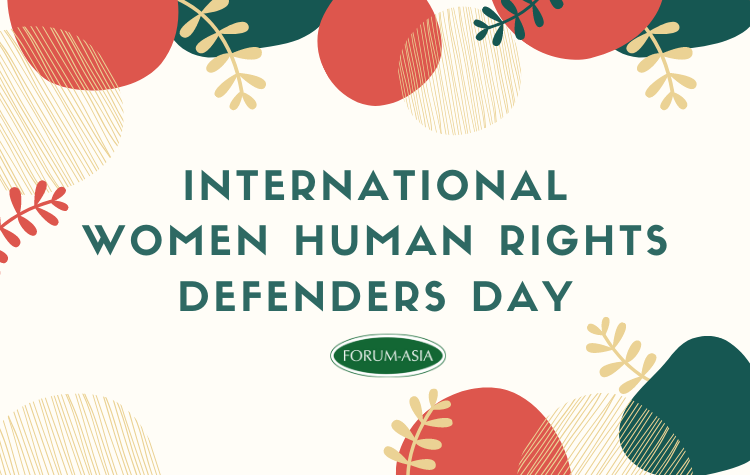(Bangkok, 29 November 2019) – Since 2006, the 29th of November marks the International Day for Women Human Rights Defenders (WHRDs).[1] The day celebrates the work and pays tribute to courageous women from all over the world, who have long been at the forefront of the collective struggle for the protection and advancement of human rights. On this day, the Asian Forum for Human Rights and Development (FORUM-ASIA) acknowledges the momentous efforts and contributions of all WHRDs, and expresses continuous support and solidarity with them and their work. This year, FORUM-ASIA is launching a new publication specifically focused on WHRDs to pay homage to these brave women in Asia and around the world.
FORUM-ASIA in the 7th of its Working Paper Series ‘WomenHuman Rights Defenders – Insights from the Struggle’ is highlighting WHRDs. The working paper includes reflections and case studies on the achievements of WHRDs and the struggles they face in promoting human rights in an increasingly challenging context. Bringing together theory and practice, the 7th working paper series is an advocacy tool to recognise and support the work of WHRDs.
WHRDs are crucial agents of change. WHRD-led movements have invariably advanced social justice and upheld fundamental rights. Regrettably, these efforts have come hand-in-hand with increased exposure to risks and threats. WHRDs are particularly targeted as a result of the work they do, especially when they: address issues related to gender and sexuality; and challenge discriminatory social and cultural norms, and on other occasions simply because of their gender identity. They do not only find themselves at risk from state actors, but also face violations from within their own families and communities.
WHRDs are among the most vulnerable of all defenders, as highlighted by FORUM-ASIA in its 2019 publication, Defending in Numbers – Resisting in the face of the oppression. Violations against WHRDs range from killings to stigmatisation,[2] aimed at discrediting their work. Many are exposed to serious psycho-social stress, among others as it is common for their family to be victims of harassment or attacks as well.[3]
Over the period of 2017-2018, of all the cases of violations committed against WHRDs more than one fourth involved acts of violence, 35 out 126 cases, a remarkably higher percentage than with other defenders. Online attacks, another form of highly reported violence, oftentimes come as a result of WHRDs exercising their right to freedom of expression, in a bid to silence or vilify them for challenging the patriarchy and other forms of inequality.
One of the key means to support WHRDs in facing these forms of violations and attacks, is a holistic protection mechanism for WHRDs at risk. Such mechanisms should provide them with: economic and sustainable livelihood; legal and political security; health and well-being; as well as other forms of socially and culturally sensitive support. They should also take into account the social needs of WHRDs. Furthermore, a collective effort should be made to raise awareness about WHRDs and their work, to increase their visibility and counter negative and damaging narratives.
Lastly, when it comes to gender mainstreaming, a feminist framework should be adopted when developing policies on gender. Primary attention should be paid to structural systemic barriers, such as militarisation, fundamentalism and globalisation, which limit women in realising the full scope of their human rights.
***
For a PDF version of this statement, please click here.
For further information, please contact:
– Human Rights Defenders Programme, FORUM-ASIA, [email protected]
[1] The definition of WHRDs includes any women – lesbian, bisexual, transgender, intersex, and non-binary gender persons – defending human rights, as well as any person of any gender defending women’s rights or issues related to gender.
[2] According to Front Line Defenders, 44 WHRDs have been murdered worldwide in 2018, marking an increase from the previous two years. See https://www.frontlinedefenders.org/sites/default/files/stk_-_full_report.pdf
[3] Front Line Defenders, Global Analysis 2018, https://www.frontlinedefenders.org/sites/default/files/global_analysis_2018.pdf




